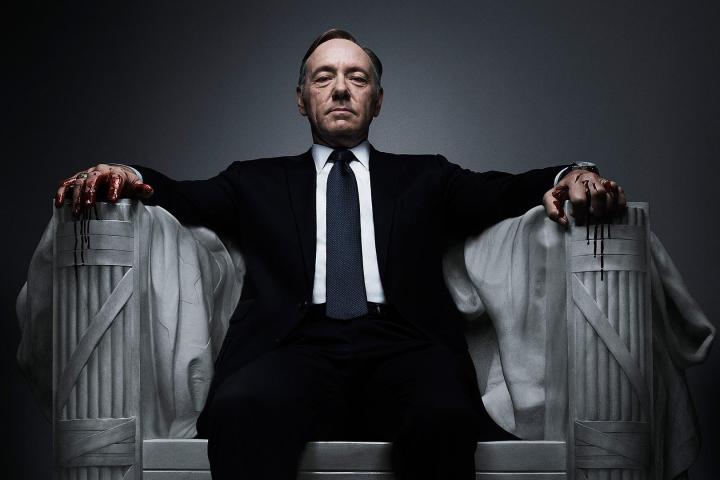
Two feet of snow suffocates everything around me. My right knee, mangled the day before while dislodging my Toyota Corolla from a snowdrift, rests atop an ottoman. I am nuzzled in grandma-knitted afghan blankets, and a pair of cats sleep heavily on my legs. A feast of junk food – powdered donuts, corn chips and neon-yellow “cheese” dip, coffee, soda, beer, and, for some sick reason, a pack of cold hot dogs – lays sprawled on the glass-topped side table.
It is late Sunday morning. The weekend chores are done. There is nowhere to go, no one to see. And an unwatched season two of Netflix’s award-winning series House of Cards awaits me in my queue: The perfect storm of couch potato freedom.
Let the binge-watching begin.
What I’m trying to say here is, binge-watching screwed with my head.
What I’m trying to say here is, binge-watching screwed with my head.
Much has been written about the pitfalls and benefits of binge-watching, a practice that Netflix believes is the “new normal,” with 61 percent of respondents to a recent poll saying they engage in the practice (defined as watching between two and six episodes in a single sitting). And 73 percent said they “have positive feelings towards binge streaming TV.” That hasn’t stopped cynical chatterboxes like myself from condemning the practice as the latest symptom of society’s ills. But, at this point, I think we can all agree that binge-watching is going nowhere fast.
My first binge-watching experience happened in 2006, back when all Netflix offered was disks shipped in the mail. My brother had the box set of Firefly, and we spent an entire Saturday in his cramped Manhattan apartment devouring what has since become a cult classic. Thanks to the entire bottle of whisky we downed, however, it was regular ol’ binge drinking that got to me more than the hours of television. Since then, I have repeated the indulgence with Lost, The Wire, and The Sopranos (minus the scotch … mostly).

So when I hit “play” on the first episode of House of Cards’ new season, which launched in the wee hours of Valentine’s Day, I knew what I was getting myself into. Six episodes in a single sitting? Ha! That’s child’s play – I was going for the full 13.
By the time I reached “Chapter 18” (episode five of the new season), however, my mind was reeling. The debauchery, backstabbing, and all around ruthlessness of Frank Underwood and the rest of the show’s characters had unsettled me. Did the world really work this way? Are our leaders this merciless and calculating? Is anything I’ve ever read (or reported, for that matter) really true? Is anything true?
When one of the journalist characters in the show said, “I’m sorry the world is this f**ked up,” I thought she was talking directly to me, about my world – our world.
Did the world really work this way? Are our leaders this merciless and calculating?
Perhaps this is merely unique to House of Cards, a show so firmly rooted in reality that one can’t help but confuse it with the Washington, D.C., we can go visit on a bus. But had I not surrendered myself to unlimited television consumption, I doubt it would have had the same effect. The story played a large role, but it was the binge-watching, the total immersion for hours on end, that left me wondering whether I can ever trust or love anyone ever again. Not unlike a trip fueled by something of a higher octane, binge-watching House of Cards left this viewer with a distorted view of reality. And still, days later, I’m trying to climb back to the surface.
Is binge-watching good or bad, you ask? Who knows? But it certainly alters the television-watching experience.


